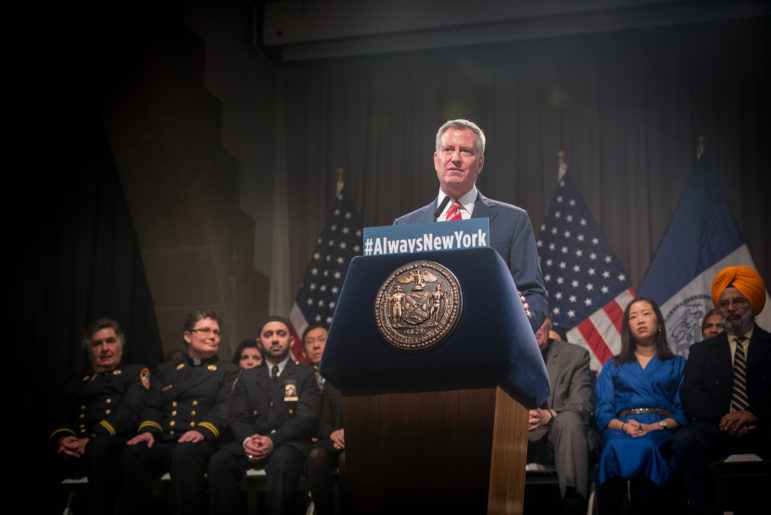
Edwin J. Torres/Mayoral Photo Office
De Blasio maps out the city's role in the era of Trump during a November speech at Cooper Union.
When I interviewed Mayor Bill de Blasio on November 3, the setting was comfortable for him, and not just because the chair he occupied in Gracie Mansion’s Peach Room was well-upholstered. I was interviewing him for an article in The Nation, which was about the only publication who’d endorsed him in 2013. And we all expected Hillary Clinton to be elected president in five days’ time.
It was in that context that de Blasio told me, shrugging off a question about whether the discontent that had fueled the Trump phenomenon disturbed him: “This will sound heretical, but almost regardless of the result of the presidential election, I do believe this is the beginning of a new progressive era. My sense is that I cannot recognize this dynamic in anything I’ve experienced in the preceding 36 years, going back to the election of Ronald Reagan…. There’s so much consistent and effective progressive activity, and it’s happening in so many places—including a lot of counterintuitive places. We’re kind of staring something in the face that has not been fully accounted for.”
“Now the challenging part is, outside of the crystallizing dynamic of a presidential campaign, how do you sustain and build on that?”
Five days later, the American political landscape shifted more dramatically than at any point in memory. And de Blasio shifted with it. He’d planned to try to capitalize on the progressive stirrings that came out of the 2016 race. Instead he claimed a role as a leader in the official resistance to Donald Trump.
If the past two months are any indication, Bill de Blasio will run for re-election against Donald Trump—as well as on his own record of policy accomplishment and management successes. (On both counts, by the way, the record is far more substantial than de Blasio’s critics give him credit for, even if it falls short of where some progressives—some who want more aggressive policies, others who want smarter politicking—hoped he’d be.) It’s unclear if de Blasio will seek a national role or wage the battle from the five boroughs. It’s also unclear whether Gov. Cuomo’s emergence as another opponent of the Trump White House will change the toxic dynamics between the men.
The Nation published the story today. Host Kai Wright discussed some of these issues with me on this morning’s Brian Lehrer Show on WNYC. Give a listen:








